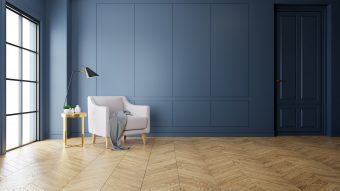December 4, 2019

When it comes to deciding between luxury vinyl tile and hardwood flooring, the lines have become blurred.
Despite hardwood floorings long-standing presence as the original flooring which produced an authentic rustic look, a look that many still find mesmerising.
Luxury vinyl has just become so good at imitating the authenticity of hardwood flooring, that is has many homeowners head over heels.
Not only that, LVT is also much cheaper, easier to maintain and continues to innovate the flooring industry.
Luxury wood design tiles and planks can provide a modern flooring option that’s beautiful, affordable and super effective at seducing the human eye.
Although, some would argue that LVT will never come close to matching the authenticity and character achieved with hardwood flooring.
To differentiate between the two, we discuss each floor type in detail based on 4 qualities:
Most would agree when we say, the beauty of hardwood flooring is timeless. If you’re after an authentic feel characterised by an individual species of wood, nothing will compare to genuine hardwood flooring.
Compared to the looks of LVT and LVP, hardwood flooring is unmatched, with only the well-trained eye being able to tell the difference between the two. However, this unique finish comes at a cost, 2-3 times more expensive to be exact.
You’ll also have to take into account the availability of the wood species and the fact that you are not easily able to customise the design, can be a nightmare when replacing damaged slats.
On the other hand, you could technically achieve 99% of hardwood floorings beautiful looks by choosing to with luxury vinyl tiles/planks.
Thanks to recent innovations, modern photography and editing techniques now give designers the power to replicate any desired wood species.
This photographic image is inserted in between the backing and clear wear layer to create an individual, nature-realistic final product, which is much cheaper compared to hardwood.
Some manufacturers are even using advanced printing techniques which produce texturised wear layers.
So now not only does your luxury vinyl look like real hardwood, it will also feel like it to. You could say this is the missing 1%.
When it comes to durability and sustainability, as a natural material, hardwood is always going to suffer the most.
Although it has a longer lifespan and can be refinished to look as good as new for generations to come, it’s cursed with a decision-changing factor.
Wood is a porous material, it is highly susceptible to liquid and climate damage. This makes it unsuitable in rooms such as a bathroom or kitchen, where spills and moisture are common.
The only safety net you really have with hardwood is applying a polyurethane coating. The downfall to this is that this coating will require regular removal and reapplication. This means hardwood flooring is not an ideal option for commercial spaces or high-traffic areas.
Don’t get us wrong, hardwood flooring is durable in the sense that it’s hard — can withstand heavy objects. However, its porous nature, constant requirement for a protective coating and limited applications makes it a hard choice.
As a synthetic material, luxury vinyl comes as one of the most versatile and durable flooring option available. It’s highly resistant to moisture and climate damage due to its construction.
Luxury vinyl is manufactured from high-quality materials and is created under great heat and pressure, a hot press. Its made up of multiple layers, including a protective wear layer which protects the surface of the floor.
Although the surface of vinyl can be scratched and scuffed over time, it can even be torn if heavy objects are dragged over the top, it’s true colours comes from being impervious to water.
With extremely durability, 20-year warranties and little to no upkeep, luxury vinyl is a clear winner suited for all applications, whether commercial or residential.
Wood flooring is most suitable in residential settings, although it can be used in commercial applications, it will require constant upkeep and maintenance.
Especially in retail spaces, corporate and office settings, where heavy foot traffic is a common occurrence. The thin polyurethane would take a beating and will require regular, often time-consuming, expensive maintenance.
Unfortunately, it does not bode well with hospitality or healthcare, as wood flooring is not nearly hygienic or durable enough, nor can it handle moisture and spills.
Limited to sports centres and residential spaces, wood flooring serves as a niche product that comes at a price.
Luxury Vinyl tile/plank comes as one of the most durable and versatile flooring option that is suitable for just about any application.
It’s highly resistant to moisture which makes it perfect supermarket, restaurants, kitchens and bathrooms.
Due to the way LVT is manufactured, it’s durability and stability makes it suitable for all commercial applications, such as retail, hospitality, education, healthcare, residential and sports.
With endless design customisation options and ease of maintenance, LVT is a hassle-free option that is unmatched next to hardwood flooring.
Hardwood flooring costs can be split into 2 categories: Grade of timber and individual species.
These prices may vary based on your location, availability of the species, how much preparation is involved and the complexity of the job. This also does not include the cost of the protective coating.
PROS
CONS
PROS
CONS
If you need to talk it out with someone, what about visiting one of our shops or contact us?